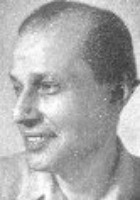Sudhindranath Dutta
Sudhindranath Dutta Poems
The tree, a shock of red and yellow, shakes its crown;
The parrot hovers, kept from nest;
The year is overblown; the hangdog sun goes down;
And bones, though old, are yet impressed.
...
This gloomy day of rain I spent in reverie.
Throwing ajar the gates of my heart,
I made an easy passage for memories.
With sightless eyes I saw
...
Sudhindranath Dutta Biography
Sudhindranath Dutta was a Bengali kayastha Indian post-modern poet, essayist, journalist and critic. Sudhindranath is one of the most notable poets after the Tagore-era in Bengali literature. Early Life and Education Sudhindranath Dutt was born in Veranasi aslo known as Kashi, a city of United Provinces in Brithish India. He went to the Theosophical High School in Varanasi between 1914 and 1917, and later attended the Oriental Seminary in Kolkata. Later, in 1922, he graduated in English from the Scottish Church College. He later studied law at the Law College (1922–1924), while also simultaneously preparing for his finals for an MA in English literature from the University of Calcutta. However, he never completed a degree (MA or a law degree) in either subject. Career Born to renowned lawyer Hirendranath Dutta & Indumati Vasu Mallik (sister of Raja Subodh Chandra Vasu Mallik), he was born with a silver spoon in his mouth. But however he failed to complete his degrees, and decided to prepare for attorneyship under his father. He completed that neither. He married Chhabi Basu in 1924. He started publishing Parichay, a literary magazine which heralded his philosophy, in 1931 and carried on with the job till 1943, when he left following ideological battle with his associates, but supplied funds nevertheless. He was also associated with Sabuj Patra, another noted literary magazine of the era, which was edited by eminent story-writer of the era, Pramatha Chaudhury. He also worked as a journalist for The Statesman from 1945-1949. He was also associated with the daily The Forward, then edited by Netaji Subhas Chandra Bose, as the organ of All India Forward Bloc. He had also worked for several companies such as Light of Asia Insurance Company from 1930–1933, ARP from 1942–1945, DVC from 1949–1954, and Institute of Public Opinion from 1954-1956. He worked as a part-time lecturer of Comparative Literature in Jadavpur University from 1956-1957. In 1957, he left for his final foreign trip and toured Japan and Europe before moving to United States of America to join University of Chicago to write his autobiography in English. However he left the lucrative job midway and returned home to rejoin Jadavpur University to resume his classes of Comparative Literature, which he continued till his death. Death He died in Kolkata in his 58th year. Trivia Sudhindranath Dutta believed that hard work is what is needed for creating art, and the embattled nature of his poetry contrasted with that of the romantic poetry of Jibanananda Das. When Jibanananda Das's poetry notebooks were printed, Dutt commented after seeing the great number of corrections and deletions in the notebooks "Oh, then the natural poets are also unnatural poets, like me!" Perhaps his most famous line is the widely quoted one from his poem Utpakhi (The ostrich): "Does hell fail to let loose because you're blind?")
The Best Poem Of Sudhindranath Dutta
The Vagrant
The tree, a shock of red and yellow, shakes its crown;
The parrot hovers, kept from nest;
The year is overblown; the hangdog sun goes down;
And bones, though old, are yet impressed.
The wind alone is loud with distant lamentations ---
An infidel intoning runic evocations,
While Time, at wanton play amidst extinct oblations,
Reiterates its ageless jest;
And rid of dust from homing kine, the sky transcends the
common noun ---
The tree's ambition and the parrot's forfeit nest.
Then all at once, uprushing from chthonic deep,
The Dark Begetter overhelms,
The wind grows deathly still, and latitudes of sleep
Disintegrate the charted realms.
Oh, no, the night is not inert: its chronic fever
Breaks out in spangled sweat, as straining at some lever,
It alters far to near; and subtle like the beaver,
The moment makes of fretted elms
An ark for perfect self-assurance. But involved in whirlwinds'
sweep,
The parrot strays till Void, triumphant, overwhelms.

I couldn't read the poem. So how can I comment?